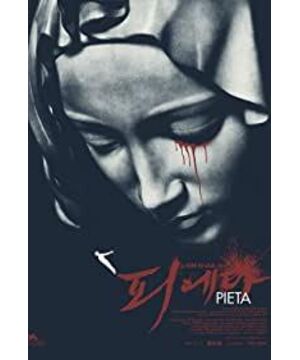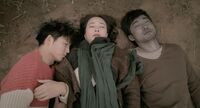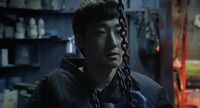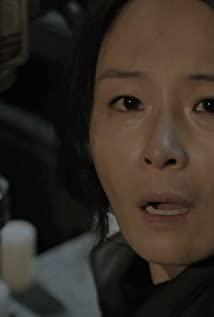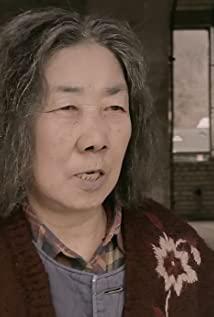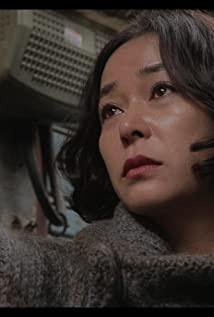1. Maternal Love and Revenge
In the background of the Cheonggyecheon Old Industrial District in Seoul, in addition to Jiang Meixuan and Lee Jiangdo, the film also portrays four pairs of mother and son from the side: Jiang Meixuan and his biological son have been together for a long time, Kaisong, Jiangzhe, and Dezheng are separated from each other. Their mother. Among the four pairs of mothers and children, except for Jiang Zhe’s mother who did not know that her son had committed suicide in the scene that appeared, she still mistakenly believed that Jiang Dao was Jiang Dao’s friend. The other three mothers took varying degrees of revenge against Jiang Dao. The film’s interpretation of the results of revenge is quite interesting: Dezheng’s mother’s revenge is powerless, and there is no other way but words; Qisong’s mother’s revenge is futile, although she is similar to Meixuan’s revenge model, that is, let Jiang Dao is full of the taste of losing her dear relatives, but the mother of Jiang Dao she misidentified, Mei Xuan, had already killed herself before she started. Although Mei Xuan's revenge succeeded, she lost the meaning of success at the moment she succeeded. Because she has developed feelings close to her mother's love for Jiang Dao, and forgiveness germinates because of her mother's love. Revenge is only a mechanical action that has to be completed in the established plan.
Maternal love in Christianity has an absolute meaning equal to that of secular life. For example, it is recorded in the "Gospel of John" that Jesus did not forget to entrust his mother to his disciple John on the cross, and his entrusted words further proved the unquestionable love of mother and son: "Mother, look, your son, ... look, This is your mother". Vengeance is rooted in the fragility of love and justice, "I am in charge of justice, and I will avenge it." Christianity advocates entrusting the authority of revenge to God as the only way to forgive others. In the film, Mei Xuan seizes the power of revenge from God with her carefully planned actions due to the loss of her son, but finally achieves the state of forgiving Jiang Dao in her heart. The impossibility of revenge is still in the grasp of God, while the possibility of forgiveness is transferred back to the human will. Going further than "Miyang" about the fair nature of God's free forgiveness, Kim Ji-duk set up an imaginary-forgiveness is based on human nature and can directly bypass divinity.
2. Sex and Money
The first scene after the film title of "Holy Sorrow" appeared was Jiang Dao waking up in the early morning to profuse himself; after that, there were two scenes about sex between Jiang Dao and Mei Xuan: in order to test his mother, Jiang Dao tried to force Mei Xuan's lower body with her hands; Mei Xuan looked at Jiang Dao tormented by fatigue and anxiety and helped him blaspheme. Interestingly, these two scenes respectively constitute two turning points in the plot: in the early morning of the second day after the occurrence of the former, Jiang Dao began to believe that Mei Xuan was his mother; while in the latter, Mei Xuan's heart gradually confirmed. Pity for Jiang Dao.
Regarding money, the critics have quite criticized the film's handling of the film. After all, after the Jiangdao debt collector chose to commit suicide, the mother and son directly conducted a metaphysical question and answer on the money, which is indeed a bit hypocritical. But I also want to open up another perspective here: The small workshop in Cheonggyecheon is where Kim Ki-duk, who was born in poverty, worked in his teens. I even saw from the debt collectors on the seventh floor that Kim was hypothesized. Shadow——"I have been here for fifty years..." Perhaps, the frequent use of mutilation of the borrower’s limbs to defraud the repayment of debts seems unbelievable in a country like South Korea. On the contrary, I believe that this is just gold. Condensation of the tragedy born out of money that I heard and witnessed in my youth. According to this interpretation approach, a similar stage drama between mother and son about money is Kim's sigh for the Cheonggyecheon-style money tragedy.
So, what role do sex and money occupy in the film’s religious connotation? In the Bible, sex and money are almost the most prominent temptations of the devil, and "greed" and "lust" are among the seven deadly sins. This creates a sharp confrontation. In the film, sex and money do not have the characteristics of "temptation". On the contrary, they are the most basic and unavailable needs of the characters in the play. Furthermore, improper sex has become a medium of self-pity, acceptance and redress, and the money in the mother's mouth is like the "Tao" in the Bible, "it is the beginning of everything and the end of everything." Outside the Jiangdao window, you can see the slogan "Believe in Jesus and get eternal life", and everything about sex and money kept in the room by mother and child is a silent refutation of this slogan.
3.
At the beginning of the movie about death and redemption , Jiang Dao is a devil who never needs redemption. After sawing off the borrower’s arm, the victim’s wife angrily accused him of being a scum, but he confidently responded that it was the scum who did not repay the borrowed money; Jiang Dao was also a devil who was never afraid of death, and appeared to him in Meixuan. At the moment of the knife, he calmly exposed the scar on his abdomen and asked her to pierce it directly. But as the devil had a mother, he began to fear death and told Mei Xuan: "I am very upset, afraid that you will leave me again, so I might not have the courage to live." And after Mei Xuan's disappearance revenge began, Jiang Dao The process of searching for his mother is actually a road to salvation: he visited several borrowers who were crippled by him in vain, fully witnessed the fruit of his sin, and sat in the wheelchair where Mei Xuan’s biological son hanged, for the first time. Shed tears.
Everyone has seen the Catholic dying confession in Balzac's novels, which is a ritual of forgiveness-through confession, the sins of the past are forgiven, so that people can be saved and reach eternal life through the valley of death. In other words, the redemption deal between man and God must be settled before death. But the trading procedure in "Shengshang" is obviously not like this. After the truth came out, Jiang Dao buried Mei Xuan and her biological son Xiangjiu, put on the sweater Mei Xuan knit for Sangjiu, picked up the iron chain that Sangjiu hung, and tied herself to the chassis of the car. There was a long blood mark on the highway. This tragic way of death was a curse against his victim's wife. If he could fulfill this curse, he must have given up the hope of returning his soul to heaven. But his purpose in doing this is also to redeem. Death itself is redemption to Jiang Dao, and death is equal to redemption.
This can be said to be a shocking ending in the history of movies, denying a sinful soul's need for the kingdom of heaven, then where should the legitimacy of Christianity be placed?
I haven't watched too many Kim Ki-duk's movies, but in a rough way, he is a director with unstable work quality. The fundamental reason is that he is a director who is too experimental. Each of his works is not only visual, but may be a subversive experiment in terms of themes, shooting methods and deep meanings. In expressing the religious connotation and social criticism of "Holy Sorrow", Kim Ki-duk's film language is also very unique: in order to express the desolation of Cheonggyecheon and the suppression of the story, the use of filters in color has taken Seoul out of the smog of Beijing; In the scenes involving death, red and blue with electro-optical colors are used to create tension and fear; the scene changes rapidly, and in some extreme plots, such as Jiang Dao lashing Kaisong against Kaisong’s mother, and beating with the bumps of the camera The audience's vision. But above these film language experiments, what Kim Ki-duk wants to express is the rupture and loss of family love, money, and all relationships in the post-industrial era of South Korea. The title of the film is "Holy Sovereign" instead of "Mother" which is as concise as Bong Joon-ho. It also highlights the film's persistent questioning whether God is still in the world.
In Michelangelo’s sculpture, Jesus gave his life for the sins of the world, and Maria, who is still alive, holds the body of Jesus with compassion. Mei Xuan, who died in Jiang Dao, held Jiang Dao's body in her arms with pity on her face. Maria was conceived by the Holy Spirit and gave birth to Jesus, while Jiang Meixuan confessed to the river because of revenge. Just as entangled with the myth of "God is dead", Jiang Meixuan and Li Jiangdao are a pair of Virgin Mary and Christ who go against each other.
View more about Pieta reviews


